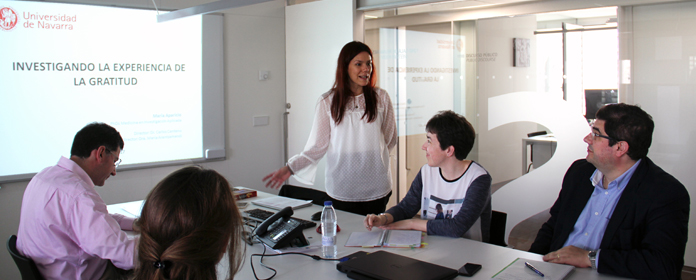How does gratitude influence the work of palliative care professionals?
María López Aparicio, an ICS ATLANTES Program researcher, will carry out research that may help improve the work practices of professionals in palliative care

FOTO: Natalia Rouzaut
María López Aparicio, an ATLANTES Program researcher at the Institute for Culture and Society, will conduct research on how gratitude affects the work of palliative care professionals and if it can help improve their daily work practices. During a seminar, Maria, a nursing professional at the Saint John Hospice (United Kingdom), advanced the details of her work, which will be directed by María Arantzamendi and Carlos Centeno, senior ATLANTES researchers.
"Palliative care professionals are more exposed to suffering— including their own, as well as that of families and patients— and this can incite fatigue, as well as cause them to leave their job.”
She thinks expressions of gratitude have a positive impact on professionals: "They help and motivate professionals, as well as contribute to fatigue reduction... It is true that professionals more easily overcome their fatigue when a patient or family member shows their appreciation."
For the expert, it is important to understand what expressions of gratitude mean for health workers, since they can be used to reinforce the positive aspects of palliative work and then replicate them and improve work systems.
"Dignity and humanization for patients and care workers can reduce fatigue and gratitude can be a factor to combat it," she said. It could also be that expressions of gratitude are motivating in the most difficult and complicated situations.
Are Spanish professionals on the receiving end of expressions of gratitude?When researching this topic, Lopez Aparicio found that there is very little literature on the subject and that, in Spain, no scientific studies have been published. She will thus conduct surveys to analyze expressions of gratitude that palliative care professionals receive in Spain.
This research has a quantitative and a qualitative component. It will begin with the former, sending an online survey, with 16 closed questions and socio-demographic data to all national palliative care services, which will give the researcher a window into the reality of expressions of gratitude. From there, she will conduct qualitative interviews with intentionally chosen professionals who make up a representative sample.
The researcher wants to know "if they receive expressions of gratitude, from whom, when, what they do, what feelings they have and what they have to say about a situation in which they have received gratitude and what it means to them."
López Aparicio hopes that her results will be an important contribution to a context in which there is increasing fatigue, helping to understand the role of gratitude and "promoting the continuation of work carried out in a dignified way."




